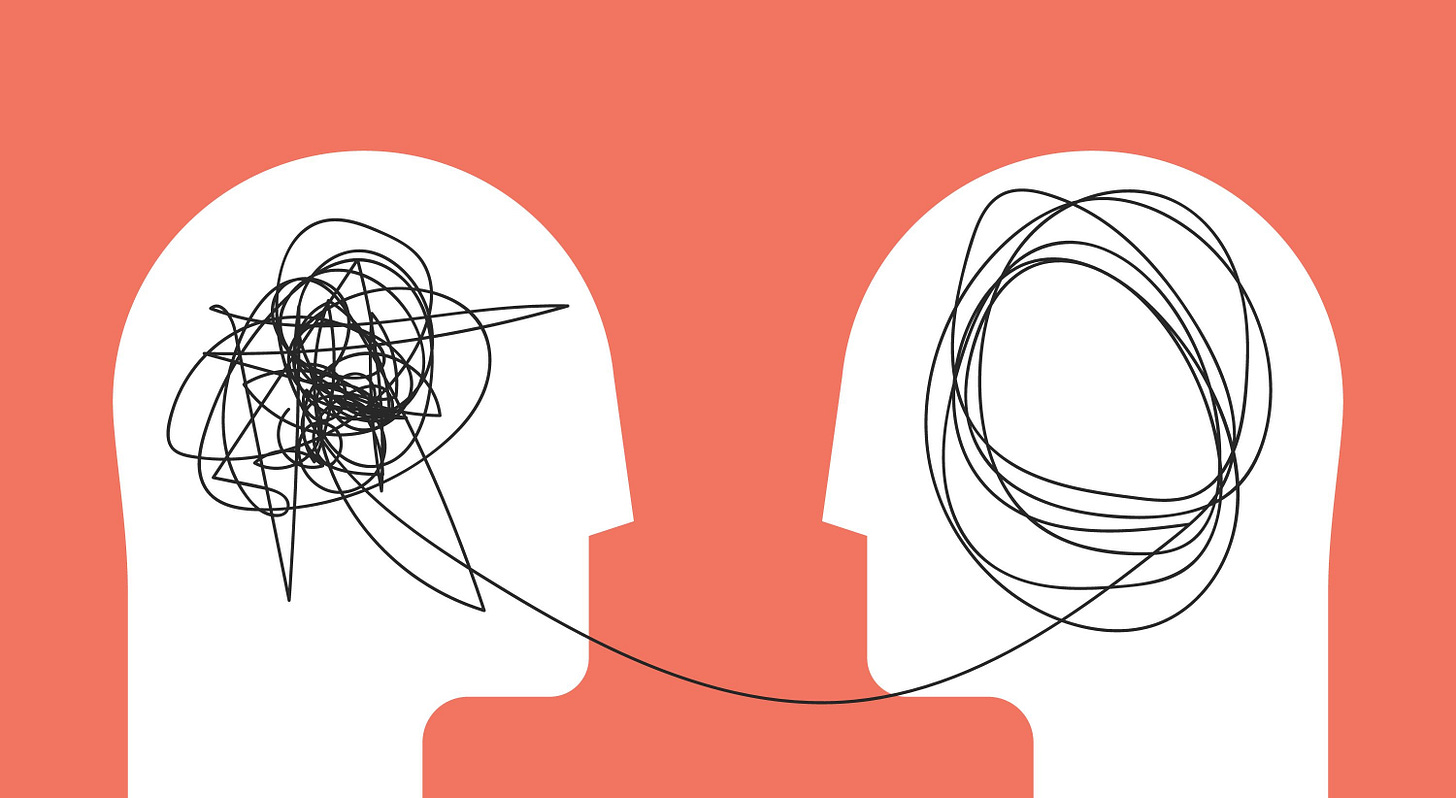E-Pluribus | May 22, 2023
How therapy got woke; yet another campus shout down; and examining "left" and "right" and what they mean today.
A round-up of the latest and best writing and musings on the rise of illiberalism in the public discourse:
Lisa Selin Davis: How Therapists Became Social Justice Warriors
Certainly one of the main aims of clinical psychology/therapy is to help patients change their way of thinking, but not necessarily to change it to the therapist’s way of thinking. Lisa Selin Davis writes at the Free Press, however, that many in the field have incorporated social justice as an underlying principle for what “right thinking” looks like, and that those training for the profession are under pressure to conform as well.
The whole point of understanding cultural differences was that you didn’t walk in and assume,” says Christine Sefein, until recently a professor of clinical psychology at Antioch University’s Los Angeles campus. But over the past decade—spurred by the rise of social media, Trump’s election in 2016, and George Floyd’s murder in 2020—Sefein, like many in her profession, began to see the mission change to something more insidious: imposing the bias and framework of Critical Social Justice (CSJ)—the term some psychologists use to refer to social justice ideology.
According to CSJ, one’s identity categories are paramount to the therapeutic process. Neutrality and objectivity—once the cornerstones of the practice—are now tools of oppression and white supremacy. The major professional organizations for the therapeutic fields have in recent years produced scholarship, mission statements, position papers, and curriculums reflecting this newfound dogma, one that leads therapists to refashion themselves into social activists.
[ . . . ]
Critics of this ideological turn have no trouble acknowledging that systemic racism, homophobia, and sexism exist, and that patients may be damaged by these forces. “Of course oppressions exist, of course unfairness,” says Carole Sherwood, a psychotherapist in the UK who has studied the impact of social justice on the field. But, she adds, “The whole idea of identity politics doesn’t fit with therapy because we look at individuals, we look at unique individuals. We don’t group people. The minute you start grouping people and slapping labels on them, you’re making assumptions.”
Read it all here.
Josiah Joner: Dr. Scott Atlas Shouted Down at New College of Florida Commencement Speech
Shout down culture appears to still be alive and well on college campuses. Josiah Joner reports at the Stanford Review that former Trump advisor Dr. Scott Atlas was the latest to face the heckler’s veto.
On May 19, Dr. Atlas, a Senior Fellow in health policy at the Hoover Institution and former Chief of Neuroradiology and Professor at Stanford's School of Medicine, who served as one of President Trump’s Coronavirus Task Force advisors, delivered the New College of Florida’s 2023 commencement speech.
[ . . . ]
His message encouraged students to be courageous leaders who stand up for truth. He recounted his own story in the White House on the Coronavirus Task Force, sharing his experience standing for truth and freedom in the midst of widespread backlash and intolerance to ideas contrary to the bureaucracy’s favored narrative. Even at Stanford, Dr. Atlas’ colleagues condemned his work and attempted to censor him.
But as Dr. Atlas spoke at the New College to discuss the need for the free exchange of ideas, using his own story and example to encourage students to stand up for truth, students jeered at his speech, shouting “Wrap it up!” While students drowned his words, Dr. Atlas closed his speech saying:
“We desperately need leadership that unites, not divides; leaders with a moral compass, who know right from wrong, who believe in strong family values; leaders who are not afraid to defend our precious freedoms – America’s hard-earned freedoms that uniquely provide opportunity sought by millions the world over; leaders with integrity—or this country, as an ethical society, as a virtuous society, as a free and diverse society, is in serious trouble."
Read the whole thing.
Jesse Walker: The Left-Right Spectrum Is Mostly Meaningless
Using the new book The Myth of Left and Right as a jumping off point, Jesse Walker at Reason discusses the history and utility of the “left” and “right” political labels. While finding the terms somewhat inadequate and at times misleading, Walker concludes with the very libertarian (and Reason-esque) kicker, “Let there be two, three, many spectrums, each making its own kind of crazy sense.”
[E]very left-right model starts to look strange if you peer closely enough. "Why do we refer to both Milton Friedman (a Jewish, pro-capitalist pacifist) and Adolf Hitler (an anti-Semitic, anti-capitalist militarist) as 'right wing' when they had opposite policy views on every point?" ask the historian Hyrum Lewis and his political scientist brother Verlan in The Myth of Left and Right, a new book that sets dynamite charges around the very concept of the political spectrum. "We shouldn't. Placing both Hitler and Friedman on the same side of a spectrum as if they shared some fundamental essence is both misleading and destructive."
The Lewises are sometimes prone to overstatement, and one of those overstatements is in that passage: While Friedman did tend to be anti-war, he was not a pacifist. But the most notable war that he supported was World War II, otherwise known as the war against Hitler. Even if the authors got their example slightly wrong, their underlying point about Hitler and Friedman is basically right.
So is their broader point. No model of the political spectrum will ever be satisfying, the Lewis brothers argue, because "left" and "right" are not actually ideologies—they are "bundles of unrelated political positions connected by nothing other than a group." An American in 2004 who wanted low taxes, a vigorous war on terror, and a constitutional amendment against gay marriage was taking "right-wing" positions, but what linked such disparate opinions? Nothing but sociology, say the Lewises: "A conservative or liberal is not someone who has a conservative or liberal philosophy, but someone who belongs to the conservative or liberal tribe."
And those tribes' outlooks evolve over time, as their positions on the issues (and the importance they grant to different issues) gradually change. There are "sticky ideologues" who stay attached to earlier tribal visions, and they're the people who end up saying things like "I didn't leave the Democrats—the Democrats left me." But it's more common to gradually move along with the crowd. It isn't the ideology that defines the tribe, the Lewises conclude: It's the tribe that defines the ideology.
Read it all.
Around Twitter
Via Richard Hanania with comment from Conor Friedersdorf, Uber eats its own DEI chief:
A short back-and-forth between professors Nicholas Christakis and Harald Uhlig on free speech, anonymity and witch hunts:
And finally, via Matt Yglesias, even the First Amendment has its limits:











